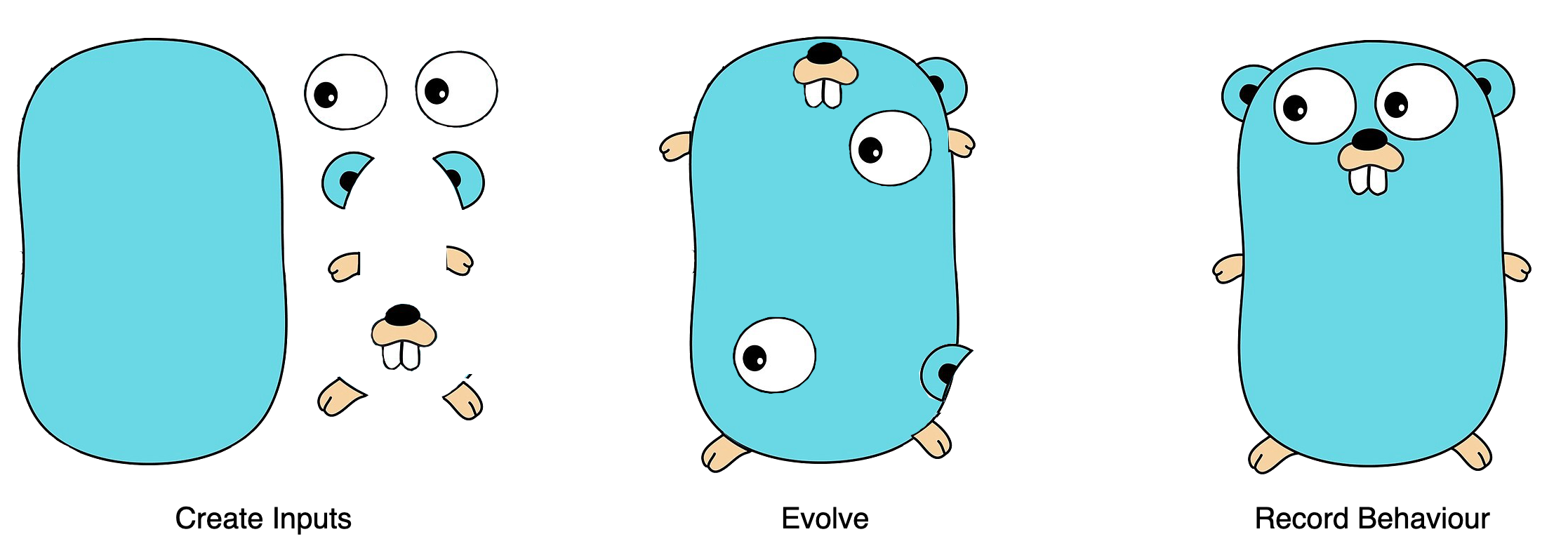Final Unit is a command line tool to automatically generate unit test cases for your Go source code. It uses evolutionary based machine learning in order to try and create a test suite with the highest coverage it can find.
Currently Final Unit relies on goimports. Make sure it's installed on your system:
$ go get golang.org/x/tools/cmd/goimportsDownload the latest release.
Make sure go binaries are available in your terminal
export PATH=$PATH:$GOPATH/binInstall the dev version:
$ go install github.com/wimspaargaren/final-unit/cmd/finalunit@latestWarning: FinalUnit reads and executes your code. Make sure no unintentional behaviour can occur.
List of available flags
Usage of finalunit:
-d string
dir for which to execute the generator (default ".")
-debug
run generator in debug mode
-no-improve-gens int
max amount of generations without improvements before the generator halts (default 10)
-org-amount int
amount of organisms in the population (default 10)
-target-fitness int
number between 0 and 100 indicating the target coverage we try to hit (default 95)
-test-cases-func int
amount of test cases created for every function (default 10)
-v run generator in verbose mode
-version
current version
Open a folder containing source code in your terminal. Execute:
$ finalunit -vDecorators are used to control unit test generation behaviour. Using the decorator file, it is possible to exclude functions and files from generation. Furthermore, decorators can be used to add custom functions to generate input values used for unit test generation. The generator will look for a yaml file called evo.yaml located in the current directory. An example decorator specification is shown below.
An example evo.yaml file is shown below
custom_vals: evo_test.go
files:
- name: myfile.go
funcs:
- name: SomeFunc
receiver_values: [customReceiverVal]
params:
- name: x
values: [CustomValueForParamX,OtherValueForParamX]
- name: y
values: [CustomValueForParamY]
- name: IgnoreFunc
ignore: trueThe decorator specification can be used to create decorators for files in a given directory.
| Field | Type | Description | Required |
|---|---|---|---|
| custom_vals | String | File path to the go file containing custom values. | No |
| files | []FileSpec | Decorator specification for files. | No |
The file decorator can be used to create custom decorators for a given file.
| Field | Type | Description | Required |
|---|---|---|---|
| name | String | Name of file on which the decorator is applied. | Yes |
| ignore | Bool | Boolean indicating if the generator should exclude this file from generation. If any additional function decorator specs are defined, they are ignored. | No |
| funcs | []FuncSpec | Decorator specification for functions | No |
The function decorator provides the possibility to define custom values for the receiver type and or parameters of a function. Furthermore, the decorator can be used to ignore a given function.
| Field | Type | Description | Required |
|---|---|---|---|
| name | String | Name of file on which the decorator is applied. | Yes |
| ignore | Bool | Boolean indicating if the generator should exclude this function from generation. If true any additional specifications will be ignored for this function. | No |
| receiver_values | []String | Decorator specifying functions having custom values for the receiver type of a function. The return type of the function should be equal to the function receiver type. | No |
| params | []ParamSpec | Decorator specification for function parameters. | No |
The parameter decorator specification provides the option to add a list of function names, which return user defined values which can be used as input values in order to create unit tests.
| Field | Type | Description | Required |
|---|---|---|---|
| name | String | Name of the parameter on which the decorator is applied. | Yes |
| values | []String | Decorator specifying functions having custom values for the specified parameter of a function. The return type of the function should be equal to the parameter type. | No |
